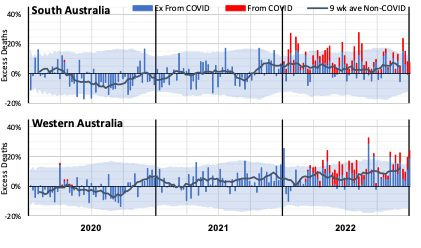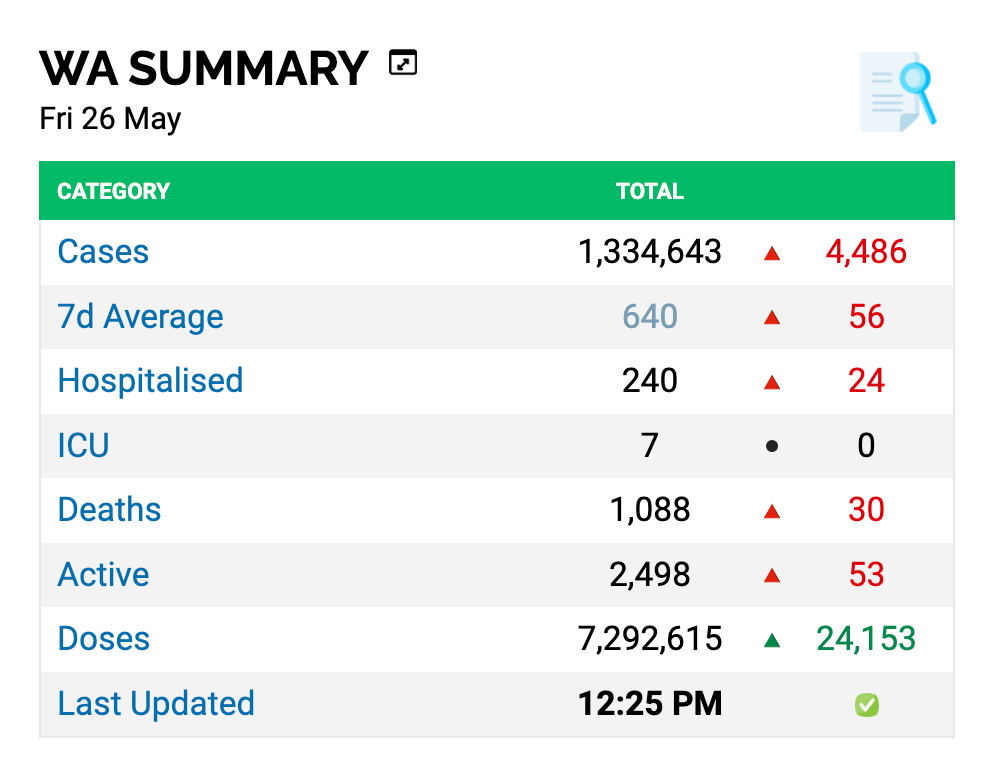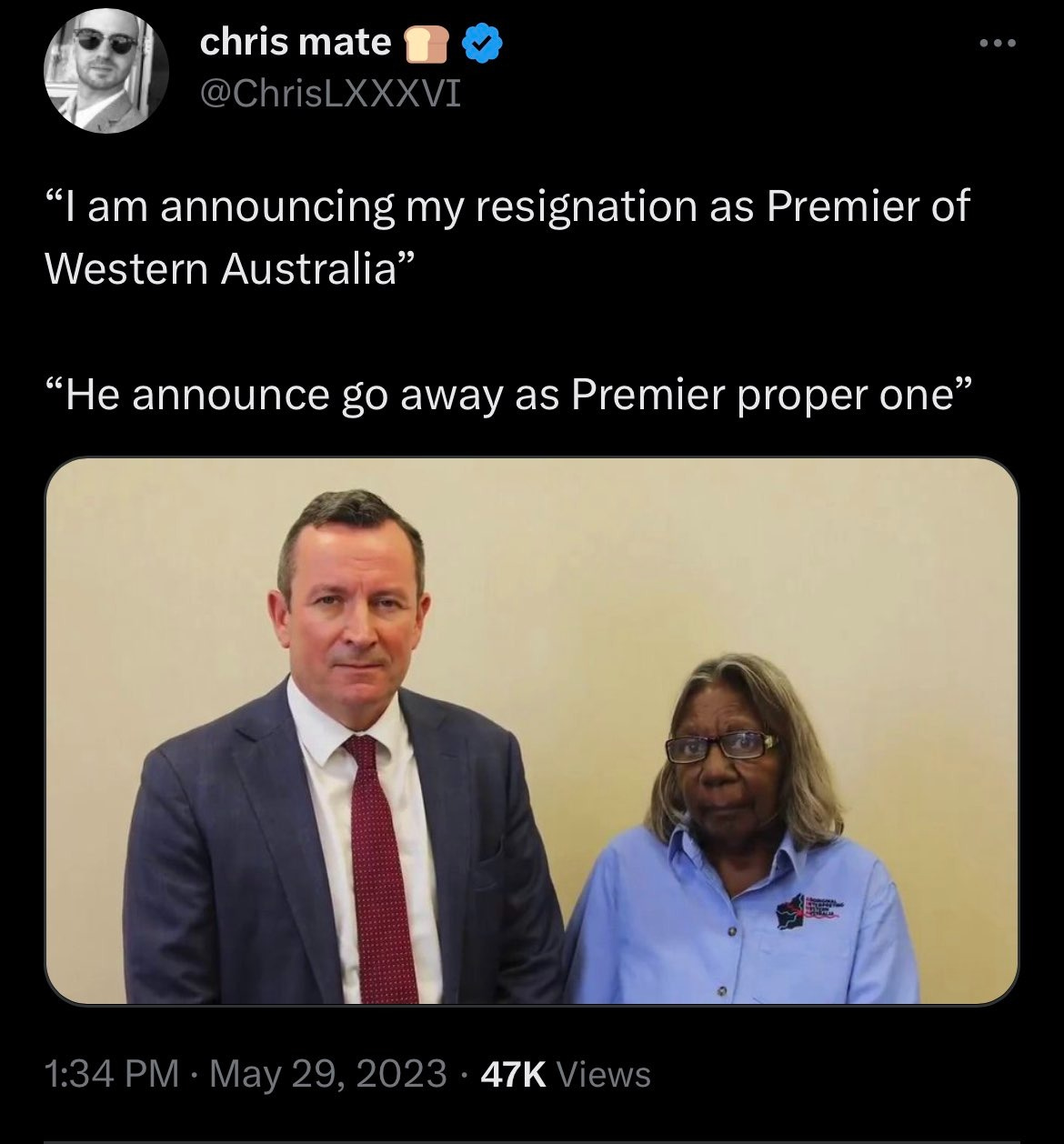Saviour or Tyrant? The Pandemic brought out West Australian Premier Mark McGowan's True Colours
Rebekah Barnett: Dystopian Down Under
West Australian Premier Mark McGowan stepped down from office this week, citing exhaustion, and a cascade of tributes ensued.
Disaffected conservatives served snark (“Goodbye to WA’s worst ever Premier”). Legacy masthead The Australian offered a level-headed wrap-up (“Leading shouldn’t be tiring, but micromanaging can be”). Sentimental media disciple John Flint, of McGowan fan zine The West Australian, opined,
“There are thousands of West Australians still alive today as a result of Mark McGowan’s decision-making in the first two years of the pandemic.
That WA’s extraordinary and drastic measures saved many lives is an unequivocal truth, regardless of whether you regarded them oppressive, over-the-top, or wholly justified.”
But did McGowan truly save lives with his 697-day nightmare border closure, coercive vaccine mandates, snap lockdowns, business restrictions and closures, endless testing, policing of masking and social distancing, and wasteful budgetary blowouts?
Or did his tyrannical measures only kick the Covid can down the road, delaying the inevitable outbreak and causing immeasurable harm in the process?
Closed borders didn’t stop excess deaths
Those who would have McGowan sainted as our Saviour tend to concentrate on 2020, when Western Australia recorded only three Covid-related deaths, and negative excess deaths. They attribute this outcome to closed borders, and assume that therefore, closed borders saved lives.
However, excess deaths started to trend upwards in 2021, while WA’s borders were still closed to the rest of the country, and the world. Though WA recorded zero Covid-related deaths in 2021, we had 700 excess deaths, or 4 per cent more deaths than expected, according to figures from Australia’s peak actuarial body, the Actuaries Institute.

Hospitals Under Strain
Ambulance ramping doubled in 2021 despite there being almost no Covid in the state.
2 In October, McGowan told a press conference that hospitals were “under enormous pressure”, speculating that the cause might be a delayed reaction to Covid. There were only 16 cases of Covid in the month of October, but there were over 1400 vaccine adverse event reports.
In fact, 90 per cent of West Australians over the age of 12 received at least one dose of Covid vaccination in 2021, resulting in an adverse event reporting rate 24x higher than all other vaccines administered that year, combined. 57 per cent of West Australians who reported Covid vaccine adverse events presented at hospital emergency departments and/or were admitted for further treatment.
The hospital strain was exacerbated by the worst nursing shortage in 50 years, with hundreds of nurses forced into unemployment for declining to participate in the Covid vaccine trial.
Open borders, soaring Covid deaths, and even more unexplained excess deaths
With the border opening on 3 March 2022, WA caught up on Covid deaths, fast. By the end of 2022, WA clocked up 1,700 excess deaths (11 per cent above baseline), of which 909 (53 per cent) were attributed to Covid.
The spike in Covid related deaths can be very clearly seen in red in the table below, right after the border opened. After taking two years to prepare for the arrival of Covid into the state, WA registered its worst ambulance ramping figures on record in 2022.
As of 26 May 2023, Covid data aggregator site Covidlive.com.au had recorded 1,088 Covid related deaths and a total of 1, 334, 648 cases since the start of the pandemic, with cases, hospitalisations and deaths continuing to mount. A total of 7.29 million doses of Covid vaccination had been administered to our population of 2.8 million people.
In other words, WA is experiencing the pandemic - just 24 months after everyone else.
Upgrade to paid
No proof that McGowan’s draconian measures benefited West Australians
To date, the McGowan government has offered no proof to support the claim that the ‘extraordinary and drastic measures’ taken have afforded any benefit to West Australians. As these measures violated human rights, civil rights, constitutional law, and economic sense, the onus is on the McGowan government to prove that these violations were worth it.
Presumably, those making such claims of benefit fall back on modelling. However, real-world data has always shown the models to be ludicrously overblown, with data from the Diamond Princess cruise ship (2020) providing the first sign that the modelled infection fatality rate (IFR) in use at the time was up to 18x higher than the real IFR.
Looking at Australian figures, two cost-benefit analyses have found that the draconian measures and astronomical spending of Australian state, territory, and federal governments resulted in significantly more harm than benefit.
3 An independent review of Australia’s Covid response found that lockdowns and border closures had been used excessively, schools should never have been closed, social disadvantage had been exacerbated by inequitable government support measures, and the elderly had not been adequately protected.
Moreover, an analysis of real-world data comparing Covid response outcomes across 108 countries showed that those countries with the highest vaccination rates and most extreme government interventions had the highest Covid death rates per capita.
The only silver lining I could concede is that, in shutting us off from the rest of the world for years, McGowan kept Covid out until the early strains gave way to milder Omicron, thereby possibly saving a small number of deaths from occurring in the elderly.
Vaccine enthusiasts will add that, at least we got everyone vaccinated before Covid came to WA. However, in light of more than 3,000 scientific papers showing mechanisms of Covid vaccine harm, including findings that repeat vaccination can cause immune tolerance and immune suppression (especially with the mRNA vaccines), coercing the population into receiving three doses should be seen as a public health policy catastrophe.
‘Extraordinary and drastic measures, oppressive, over the top’
Mark McGowan enforced the toughest proof of vaccination restrictions in the world (close rival, Saskatchewan), locking the unvaccinated minority out of the economy and most of society. He closed the borders to our state for 697 days, separating families for years, which led to suicides, and prevented children from attending their parents’ deathbeds. He imposed multiple lockdowns throughout 2020 and 2021 which crippled small businesses, leading to permanent closures and significant economic losses.
Under McGowan, West Australians received prison sentences for offences such as allowing tradies to work at their property during self-quarantine, entering the state without permission, or having a picnic with a dying parent. Police officers intruded into church services to conduct mask inspections, and businesses were raided to check vaccination certificate compliance.
McGowan was a divisive leader, name-calling anyone who disagreed with his policies as would a schoolyard bully. He scoffed at the thousands of protestors who showed up week in, week out in opposition to coercive vaccination mandates and ongoing lockdowns and border closures, calling them “anti-vaxxers,” “misfits” and “losers”, and instructing them to “grow a brain.”
McGowan frequently lied to the public about the risks and benefits of vaccination, including misleading with statistics about how many unvaccinated people were languishing in hopsitals, and asserting that unvaccinated people posed a risk to Good West Australians, at a time when the scientific literature and the real world data proved otherwise.
Young people suffered mentally and emotionally under the McGowan government’s pandemic measures. Youth suicides increased in 2020, accounting for almost 40 per cent of deaths in West Australians aged between 15-24. The proportion of WA high school aged students experiencing difficulty and distress increased from 14 per cent (2013/2014) to 40 per cent in 2020, a study found. In the following year, mental health and suicide prevention services reported significant increases in calls and psychological distress around the country, WA being no exception.
After initially banning rapid antigen tests (RATs) under threat of fines of up to $100,000, the McGowan government so badly mismanaged the hasty procurement of RATs for the state that they blew $580 million on the tests - enough to fund the Bunbury Hospital redevelopment twice over. Auditor General Caroline Spencer said, “I have never before witnessed such escalation in the cost of a program over such a short time frame, occurring with a lack of due consideration of the impacts, or without a record of anyone pausing to ask what level of procurement was sufficient and whether this had been achieved." You can find many of the purchased RATs expiring in freebie bins at Bunnings.
McGowan’s paternalistic urge was exhibited in one of the most on-the-nose public health campaign videos of all time.
5 McGowan’s rule preventing unvaccinated people from purchasing alcohol at the drive-thru was widely perceived as intended to coerce regional Indigenous vaccine refusers into submitting to vaccination. Had McGowan not strong-armed First Nations peoples into participating in a medical trial in exchange for their right to work, visit family in hospital, or purchase alcohol, this video might not have come across as so offensive.
McGowan’s legendarily oppressive pandemic policies aside, he will be remembered for a series of bungles and scandals, including the international scandal of fraudulent gold doping at the Perth Mint (this fell under McGowan’s portfolio as Treasurer), and the death of seven-year-old Aishwarya Aswath due to understaffing at Perth Childrens Hospital in 2021.
McGowan will also be remembered for his penchant for power, and his lack of respect for due parliamentary process.
McGowan held on to his State of Emergency powers for 963 days, testing the goodwill of even his fanbase. He gained a reputation for using his party’s parliamentary majority to ram legislation through without proper debate, such as the police-statey Emergency Management Bill that he dumped on the Opposition and crossbench with only a day’s notice.
Opposition leader at the time, Mia Davies said of the move, "It is an absolute contemptuous and arrogant government that brings legislation of such significance to Parliament and expects it can be dealt with in a day."
In truth, it wouldn’t have mattered how long the Opposition had to review the bill. The parliamentary debate was for show. Labor forced the legislation through despite vehement opposition and well-attended protests on the steps of Parliament House.
Approval ratings in decline
McGowan’s resignation announcement made for a sympathetic ending to his popular run as Premier. He told the press on Monday,
“But the truth is I’m tired, extremely tired. In fact, I’m exhausted. The role of political leadership does not stop, it is relentless with huge responsibility but it is all-consuming, each and every day. And combined with the Covid years, it has taken it out of me.”
The timing is great. Like New Zealand Prime Minister, Jacinda ‘single source of truth’ Ardern, who also resigned due to exhaustion at a time when public sentiment towards her was turning, McGowan’s popularity from the pandemic period was on the wane. Bowing out several months after your lowest approval rating in years is a great way to leave on a high, awash with tributes.
McGowan leaves dormant police state in place for successor
McGowan is succeeded by Deputy Premier, Roger Cook. Cook’s ascendance was featured on the front page of The West Australian in what may be a sly attempt at conspiracy-theorist-baiting (I suggest you don’t bite).
McGowan leaves Cook a dormant police state. Under McGowan’s leadership, police powers have been extended and the above-mentioned Emergency Management Bill will allow the Police Commissioner to order force vaccinations, enter private property without a warrant, or confiscate private property should the Covid State of Emergency be given another guernsey.
During McGowan’s Premiership, WA Police welcomed a Boston Dynamics robot dog to the force, which the Police Minister said would be beneficial for dealing with bombs. We now have even more surveillance on the roads, with mobile point-to-point cameras creating a moving panopticon. And, we have the escalation of police raids and harassment of journalists and activists, in a pattern of behaviour that journalist Jesse Noakes called “preemptive policing.”
Whether Roger Cook will advance the police state remains to be seen.
Rebekah Barnett writes for Dystopian Down Under. She holds a BA (Hons First Class) in Communications.









